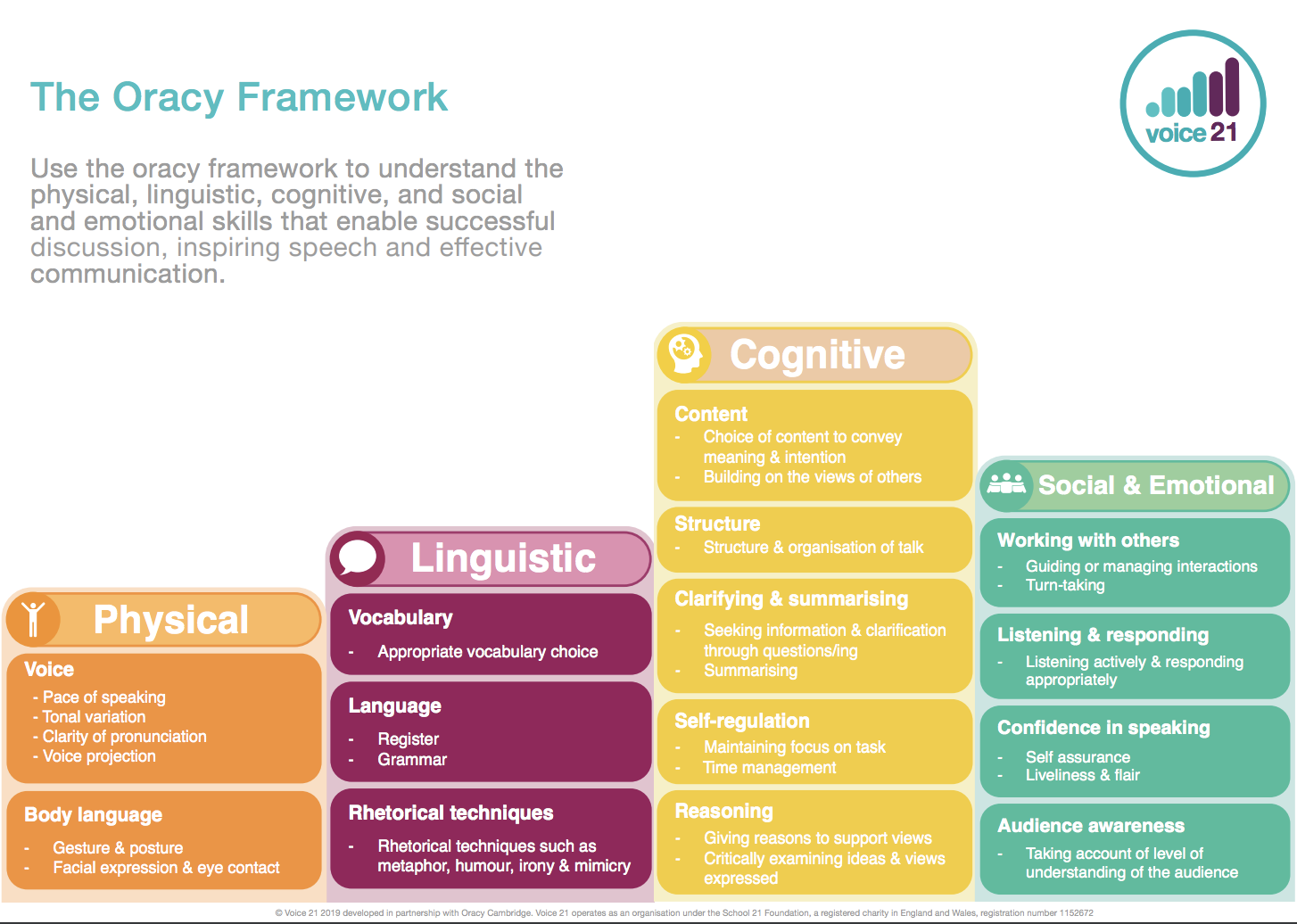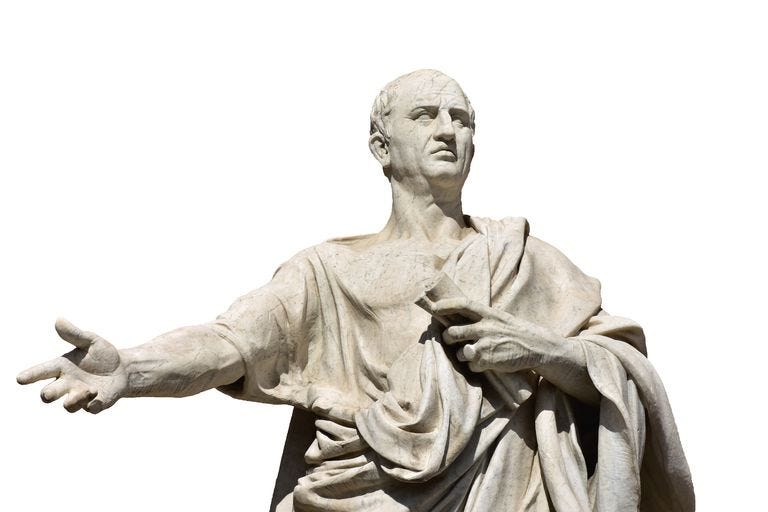Oracy is the ability to express oneself fluently in speech. For pupils to express themselves eloquently they need to be aware of the various strands of oracy: audience, tone, pitch, volume and purpose.
Teachers should also be aware of different aspects of oracy:
- Physical oracy- pace, projection, clarity and interaction with audience.
- Linguistic oracy - use of higher level vocabulary, language devices and correct tenses and grammar.
- Cognitive oracy - expressing opinions, building answers to questions, planning things to say, clarifying by asking questions, summarising and debating.
- Social and emotional oracy - confident to speak publically, respectful listening, using language with flair, varying language to suit purpose and audience.
 |
| The oracy framework from voice 21 provides a good overview of the different strands and aspects of oracy. |
Additional Literature Review
Robin Alexander 2005 in the National Literacy Trust suggested an oracy repertoire can affect our success and long term direction in life. This learning talk repertoire includes the ability to: narrate, explain, instruct, ask different kinds of questions, receive, act and build upon answers. This in turn allows students to analyse and solve problems, speculate and imagine. These skills are associated with higer living standards and self-esteem as students can access culture ad its benefits rather than feel excluded from it.
To enable this Mercer 2008 suggests that we need ‘talk for learning’. There have to be clear conditions for this to happen:
- everyone listens actively
- people ask questions
- people share relevant information and ideas may be challenged
- reasons are given for challenges
- contributions build on what has gone before
- everyone is encouraged to contribute
- ideas and opinions treated with respect
- there is an atmosphere of trust
- there is a sense of shared purpose
- the group seeks agreement for joint decisions.
 |
| Oratory (or rhetoric) was one of the three strands of learning classified by Plato. The other two were grammar and logic.This model of learning was used for thousands of years. |
Intervention
The focus for this intervention was to target year 7 pupils to develop their oracy skills in PE. They are mixed in terms of academic ability and have identified different areas of oracy that they consider to be strengths and areas for development. The areas for development have been identified as physical oracy (clarity, volume, projection) and a need to develop an understanding of new words with particular reference to physical education content.The process for the intervention is as follows:
- Pupils current oracy skills assessed through questionnaire and observation of leadership skills in PE lessons.
- Pupils to attend an extra curricular sports club for three weeks to support teacher delivery and develop confidence with leadership and oracy.
- Pupils to lead parts of a session within a PE lesson to peers and apply oracy skills.
- Reassessment to occur through observation of leadership and through re-completion of questionnaire.
If this process is successful additional leadership provision at year 7 level is to be written into the curriculum to develop the oracy skills of all young students further.
Implementation and Impact
Pupils led warm ups for PE lessons to aid their phsyical oracy development (volume, clarity and projection). Key words were also identified at the start of each lesson to develop PE based vocabulary.
It was also an intention to have pupils attend extra-curricular sports clubs and lead some more aspects of these sessions. This has been more sporadic as pupil attendance is optional.
In the initial stages, pupils were relatively quiet and lacking in confidence when leading others in lesson. This confidence grew over time for all of the students but some still remained relatively quiet. Clarity was the area of oracy that showed the greatest improvement as the pupils realised they needed to explain things clearly to get others to do what they wanted to do correctly.
Pupils indicated that they felt more confident in many aspects of oracy when they completed their questionnaire again. They also indicated their vocabulary developed through the use of key technical terms. An area that showed a significant improvement in questionnaire results was cognitive oracy where pupils learned to think about what they said before they said it. This was not an intended aim for the intervention but is an area where pupils showed development. It is worth noting that pupils may have been inclined to state that they have developed their oracy skills to be positive about the experience, so this has to be taken into consideration.
 |
| The importance of developing key word understanding is crucial to the development of cognitive oracy. |
From my own personal observations you could see that some pupils were initially uncomfortable with giving verbal instructions to others but gained confidence and skill throughout the process. The pupils would clearly benefit from further opportunities to develop oracy skills across the school.
Recommendations
- Model the strands of oracy as a classroom teacher.
- Ensure students are well versed in key vocabulary to enhance cognitive oracy.
- Provide opportunities for students to explain concepts/instruct others and allow them to practice these explainations or instructions.
- Ensure students are aware of the benefits of good oracy.
- English Speaking Union - The basics of Oracy
- English Speaking Union - Speaking Frankly
- David Didau - Developing Oracy
- Tom Sherrington - Modelling Good Speech
- Josep Coral - Contributionf or Physical Education to English Oracy

No comments:
Post a Comment